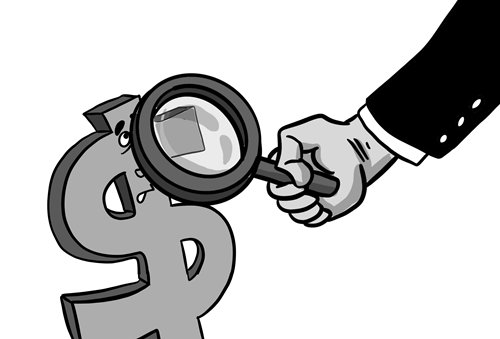HOME >> BUSINESS
Fed’s unpredictably ‘Trumpish’ monetary policy brings uncertainty to global market
Source:Global Times Published: 2019/5/29 20:38:41

Illustration: Luo Xuan/GT
Despite the calls for lower interest rates, US Federal Reserve Chairman Jerome Powell recently indicated that the Fed will remain cautious and keep rates steady for some time. It seems it has become more difficult for the market to predict the future economic situation and monetary policy. The Fed appears to be more and more "Trumpish" in setting monetary policy. Just like US President Trump, the central bank has become unpredictable, succumbing to political and capital market pressure due to its weakening role as an independent decision-maker over monetary policy.
The framework indicators of the Fed's monetary policy are increasingly inconsistent with changes in the economic environment. The deviation between the robust employment data and sluggish inflation has made it difficult to find a clue for the economy within existing monetary policy theory. Even billionaire Warren Buffet said that the current economic environment is one that no one could have seen coming. "No economics textbook I know that was written in the first couple of thousand years that discussed even the possibility that you could have this sort of situation continue and have all variables stay more or less the same," he said in a recent interview. "I don't think our present conditions can exist in terms of fiscal and monetary policy and various other elements across the political landscape."
Goldman Sachs economists Jan Hatzius and David Choi said in an April note that the Fed's relative predictive advantage versus private economists has declined in recent years as the higher quality and quantity of forecasters make it harder for anyone, including Fed staff, to beat the "wisdom of the crowd." It also means that after hawkish monetary shocks, such as a surprise rate hike or indication of higher rates, markets tend to react negatively, and consensus growth forecasts decline. They found that "information effects," or reactions caused by the Fed likely having insight that others don't, have mostly gone away. This means that in the future, it will be more difficult than before to predict the US economy and monetary policy.
Against the backdrop of the deteriorating trade frictions, slowing global economic growth, and fluctuations in the US and international capital markets, the Fed has been taking a "wait and see" attitude. Powell made a series of confusing speeches this year, leaving the market with no clue about the Fed's policy orientation. Of course, it is difficult for the Fed to adopt a balanced monetary policy under the complicated global economic situation.
Meanwhile, repeated criticism by President Trump has continued to undermine the Fed's authority. The Fed's move to abandon its long-held austerity policy harmed its independence greatly. After taking office, Powell wanted to maintain the Fed's independence by continuing the rate hikes and shrinking balance sheet, but it seems that he failed to hold up the pressure from Trump. This has led to US monetary policy becoming "Trumpish." Any move the Fed has made to calm the market seems to be a surrender to Trump's demands. In short, the Fed must give some response to Trump's "willful" requirements. Moreover, the capital market is suspicious of the Fed's policy because of Trump's criticism. More market participants have joined the team in complaining about the Fed, making the market more sensitive. Mohamed El-Erian, chief economic adviser for Allianz, once said that the Fed lacked a sense of what's going on with markets. "The Fed needs to develop a better understanding of market technicals - or what some call a 'feel' for the markets," he said.
In our opinion, the "Trumpish" monetary policy means that the Fed is losing the transparent and predictable guiding role of monetary policy, resulting in increased market volatility. This means that due to political pressure on the US government to maintain economic growth and sustain the bubbles in the financial market with excess capital, the Fed will no longer adhere to the old principles and monetary policy frameworks, which will increasingly cater to administrative needs and capital market demands. Therefore, when the US economy shows signs of decline and markets move downward, the Fed may succumb to Trump's demand for lower rates and monetary easing. A re-launch of quantitative easing could mean the Fed gives up its policy independence and opts for a "Trumpish" approach. Many institutions also predict that the Fed will announce rate cuts this year and may resume large-scale bond purchases as early as next year.
Once the Fed re-launches QE, the "Trumpish" monetary policy will only become more unpredictable, and this kind of uncertainty will make the global capital market more cautious. But for China, the Fed's monetary easing will undoubtedly ease the pressure of US-China trade frictions on the yuan exchange rate. It will also free up more room for China's own monetary policy to maintain economic growth.
The article was compiled based on a report by Beijing-based private strategic think tank Anbound. bizopinion@globaltimes.com.cn
Posted in: EXPERT ASSESSMENT